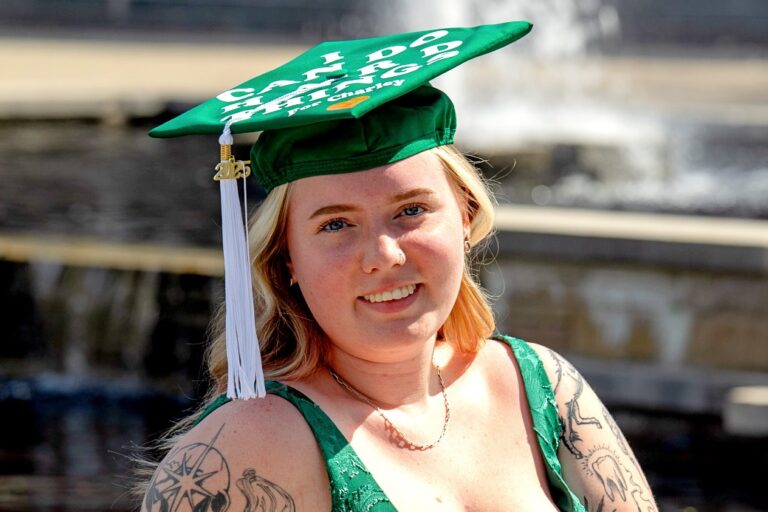Hailey Becker, a Michigan State University graduate student, is shining a light on campus with her art exhibition that recently was featured in the MSU Libraries Digital Scholarship Lab as part of the MSU Digital Humanities Graduate Arts Fellowship.

“Where the Light Gets In” is an installation Becker created in the Digital Scholarship Lab (DSL) that showcases her art installations across MSU’s campus. Becker, who is currently enrolled in a first-of-its-kind dual program that combines a Master of Fine Arts degree in Studio Art with a Ph.D. in Forestry, collaborated on the original exhibition with 2024 MSU Master of Fine Arts graduate Patrick Taylor. For that initial exhibit installation in October 2024, Becker and Taylor mounted LED lights on 43 trees marked for removal on campus, placing the beams so they appeared to be piercing the trunk, or heart, of the individual trees.
Becker was selected for the 2025 Digital Humanities Graduate Arts Fellowship based off her proposal to create an immersive display in the 360 Room that documents the installations via a virtual tour using StoryMaps. The StoryMaps virtual tour created by Becker also details the location of the “iconic and beloved” Amur cork tree in MSU’s Beal Botanical Garden. The placard in front of the tree includes a QR code that links to the virtual tour of the installations around campus using YouTube 360.

MSU Libraries Head of Digital Scholarship Services Justin Wadland praised Becker’s distinctive proposal.
“I am always delighted to see the creative projects that come out of the Graduate Arts Fellowship,” Wadland said. “This year, Hailey has created a unique, site-specific, multidimensional work that uses an impressive array of digital methods and tools. I especially appreciate how her 360 videos immerse the viewer in her installations and give just enough explanation of their purpose to encourage reflection about changes to the campus landscape.”
To complete the fellowship, Becker presented an artist talk along with the 360 Room tour of “Where the Light Gets In” as well as a workshop on “Using 360 Cameras to Show Changes to Place.”

Interim Director of Digital Humanities Kristen Mapes shared enthusiasm about both the immediate and future impact of Becker’s fellowship work.
“Hailey’s work through the fellowship is an inspiring demonstration of how digital methods can be leveraged across artistic and humanistic practice to connect with people,” Mapes said. “The on-site installations have been seen by thousands of people across campus and resonate immediately, and the work coming out of the fellowship gives future generations the opportunity to explore and relate to Hailey’s work in new ways.”
During her time as a Graduate Arts Fellow, Becker had the opportunity to experiment with tools like 360 cameras and an ambisonic mic, in addition to utilizing the 360 Room and the StoryMaps technologies. She also spent time in the MSU Libraries Hollander Makerspace using aluminum and acrylic to make the plaques included in the StoryMap.

“I had a wonderful time participating in the fellowship,” Becker said. “The support staff were friendly, knowledgeable, and helpful. There was the perfect blend of structure and freedom to experiment. The staff worked closely with me to help troubleshoot technology issues, give feedback on in-progress work, and help me realize my overall vision.”
The Digital Humanities Graduate Arts Fellowship is a partnership between the College of Arts & Letters Digital Humanities program and the MSU Libraries DSL. This annual program offers fellows summer funding and the opportunity to advance their proposed projects using expertise and resources from the DSL, including office space, technology, and consulting support from librarians and staff. Fellows also are encouraged to deposit their artwork, including Becker’s recent exhibition, in MSU Commons/KCWorks for long-term access.
For more information about the Digital Humanities Graduate Art Fellowship, please visit the MSU Digital Humanities website.
By Elise Jajuga, Communications Manager, MSU Libraries, and originally published on the MSU Libraries website


